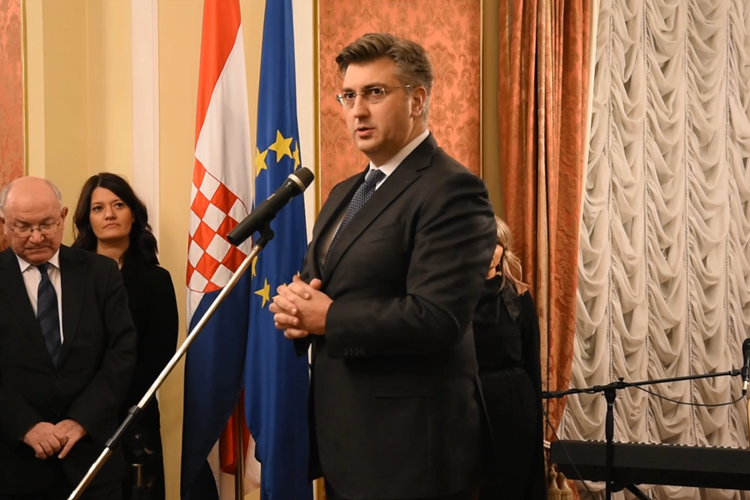- Published: 20.12.2017.
Coming closer to euro area, Schengen and OECD are Croatia's foreign policy priorities for 2018
Coming closer to the euro area, the Schengen area and the Organisation for Economic Cooperation and Development (OECD) are Croatia's three foreign policy priorities for 2018, Prime Minister Andrej Plenkovic and Foreign Minister Marija Pejcinovic Buric said at a reception for foreign diplomats in Croatia on the occasion of the Christmas and New Year holidays.
Our ambition in the years ahead is to meet the necessary criteria for adopting the euro, to become part of the Schengen area and to join the OECD, the remaining international organisation which Croatia is not yet a member of, Plenkovic said at the reception which was also attended by President Kolinda Grabar-Kitarovic, cabinet ministers, religious dignitaries, senior executives and union leaders.
"I am confident that we will accomplish these aims through close cooperation between the President of the Republic, the parliament, diplomats and other stakeholders in society, and the accomplishment of these goals will bring about a better life for our citizens," the premier said.
"The outgoing year has been more challenging than anyone could have expected," not only because we have tried to implement a number of measures planned in our political programme, but also because we faced "certain inherited issues and a sort of crisis management," he added.
Plenkovic expressed satisfaction with the success of his government in implementing the law on emergency administration in companies of systemic importance, averting a large-scale economic crisis in the country and possible domino effects for other companies and the financial system in the country.
These successful efforts resulted in record results in the tourist season and continued good macroeconomic trends in 2017, Plenkovic said.
He called for building "a tolerant, inclusive society that respects human rights, freedom of the media, free speech and free expression of criticism, and a society in which minorities are strongly protected and integrated."
Pejcinovic Buric said that Croatia's foreign policy priorities for next year remained the same -- further strengthening and development of the European Union and its expansion towards Southeast Europe, active participation in international institutions, and stronger cooperation with Eurasia, Africa, South America and Australia.
This year Croatia has begun an engagement within the United Nations Human Rights Council and will remain in it until 2019, while as of May next year it will chair the Council of Europe's Committee of Ministers, the foreign minister recalled.
This year Croatia also chaired the Southeast European Cooperation Process and next year it will chair the Central European Initiative, she added.
This year Croatia has begun intense preparations to assume the presidency of the Council of the EU in 2020, which Pejcinovic Buric said would be "a major test for our diplomacy and public administration", and has also begun preparations for membership of the Organisation for Economic Cooperation and Development.
Pejcinovic Buric also mentioned the 16+1 initiative, which includes 16 Central and Eastern European countries and China, and a conference that would take place as part of this initiative, expressing hope that Croatia would assume the chairmanship of this initiative in the forthcoming period.
Text: Hina
